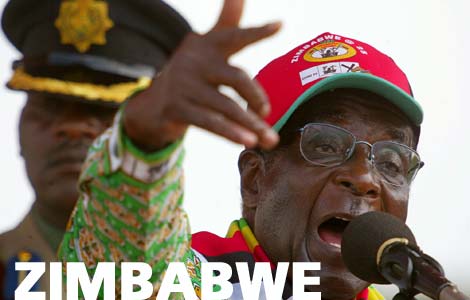ROUNDUP: Zimbabwean unity government sealed amid climate of distrust
 Harare - Zimbabwean President Robert Mugabe swore some of his fiercest critics into a power-sharing government on Friday, sealing the beginning of a reluctant union which Zimbabweans hope will end the country's economic crisis.
Harare - Zimbabwean President Robert Mugabe swore some of his fiercest critics into a power-sharing government on Friday, sealing the beginning of a reluctant union which Zimbabweans hope will end the country's economic crisis.
Two days after he ceded a portion of his powers to long-time opposition leader Prime Minister Morgan Tsvangirai, Mugabe swore in ministers from the Movement for Democratic Change (MDC) and his own Zanu-PF into a 31-ministry coalition cabinet.
Of the 31 ministries, 15 went to Zanu-PF and 16 to the MDC, 13 for Tsvangirai's faction and three for a smaller breakaway faction.
Among the notable newcomers to government is MDC Secretary General Tendai Biti as finance minister. Biti, a lawyer, who initially resisted Tsvangirai's proposal to join the Mugabe-led government, was sworn in despite being charged last year with treason.
The inauguration culminates the implementation of a September power-sharing accord that gives the MDC its first taste of power after a decade in opposition.
While Zimbabweans have welcomed the decision by the rivals to work together towards a period of national healing, the coalition's bumpy birth laid the groundwork for a protracted period of infighting.
Minutes before the swearing-in, the MDC's candidate for deputy agriculture minister, Roy Bennett, 52, was arrested.
Bennett, the MDC's treasurer general, who was due to be sworn in along with other deputy ministers next week, was nabbed at a small Harare airport as he was about to fly to Johannesburg, an MDC statement said.
The reason for his arrest was not yet known but Bennett, a former MP, whose coffee plantation was seized in 2003 during the country's lawless land reform campaign, had been fingered by police in 2006 as the purported mastermind in an alleged plot to assassinate Mugabe.
Bennett denied the allegations and fled to South Africa, where he received asylum. He had slipped back into Zimbabwe last month to lend his support to the formation of the government.
In another inauspicious sign for the government, the inauguration was delayed for over two hours by fresh wrangling between the parties over the number of ministers.
The MDC accused Zanu-PF of exceeding its quota, prompting a flurry of last-minute negotiations.
Mugabe's choices for ministers included many faces from his last cabinet, which the 84-year-old leader had himself described as his worst ever.
They include Emmerson Mnangagwa, head of the Joint Operations Command security cabinet that directed last year's campaign of post- election violence against the victorious MDC, and hardline former lands minister Didymus Mutasa.
Zimbabweans are counting on the new administration to bring about change in a country that is reeling from world-record inflation, severe food, fuel and cash shortages, and raging HIV and cholera epidemics.
But analysts warn that the MDC's ability to effect change is hampered by the skewed sharing of power between the parties. Mugabe remains head of state and government, while Tsvangirai's role will be to formulate and implement policy.
Zanu-PF retains most of the key ministries such as defence, state security and information, while the MDC gets saddled with the difficult finance and health portfolios.
Tsvangirai moved quickly this week to put his stamp on the government, pledging to "get the country working again" by paying civil service workers in hard currency.
Nurses, doctors, teachers and police officers have walked off the job in droves over the past year as nine-digit-plus inflation erodes the value of salaries paid in local currency.
The civil service wage bill is estimated at between 60 and 100 million US dollars a month. So far, the MDC has been tight-lipped about where the cash-strapped government would get the money.
Western donors have made clear that they will wait to see proof of real reform before ploughing money into a Mugabe-led government. (dpa)